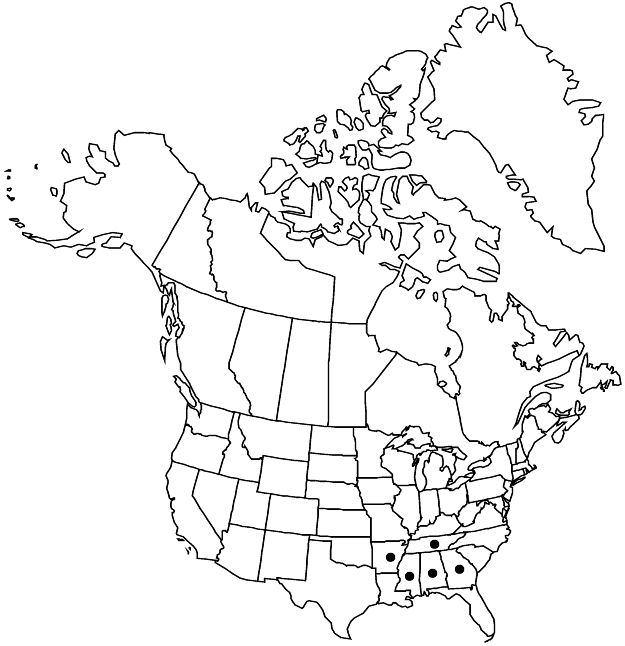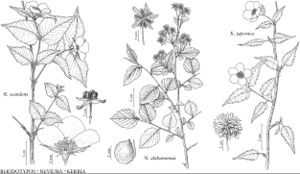Difference between revisions of "Neviusia alabamensis"
Mem. Amer. Acad. Arts, n. s. 6: 374, plate 30. 1859.
FNA>Volume Importer |
FNA>Volume Importer |
||
| Line 35: | Line 35: | ||
|distribution=Ala.;Ark.;Ga.;Miss.;Tenn. | |distribution=Ala.;Ark.;Ga.;Miss.;Tenn. | ||
|discussion=<p>Of conservation concern.</p><!-- | |discussion=<p>Of conservation concern.</p><!-- | ||
| − | --><p>Neviusia alabamensis has been recommended for federal listing under the Endangered Species Act. The species is known currently from five southeastern states; a population known earlier from Poplar Bluff, Missouri, has been extirpated (D. M. Moore 1956).</p><!-- | + | --><p><i>Neviusia alabamensis</i> has been recommended for federal listing under the Endangered Species Act. The species is known currently from five southeastern states; a population known earlier from Poplar Bluff, Missouri, has been extirpated (D. M. Moore 1956).</p><!-- |
| − | --><p>The disjunct populations appear to be relicts from a former more widespread distribution and perhaps were associated with mesophytic forests during the Tertiary (A. A. Long 1989). It also has been suggested that Neviusia alabamensis is an epibiotic taxon that survived the Mississippi embayment since the late Paleozoic or early Mesozoic (D. M. Moore 1956; D. D. Horn and P. Somers 1981).</p><!-- | + | --><p>The disjunct populations appear to be relicts from a former more widespread distribution and perhaps were associated with mesophytic forests during the Tertiary (A. A. Long 1989). It also has been suggested that <i>Neviusia alabamensis</i> is an epibiotic taxon that survived the Mississippi embayment since the late Paleozoic or early Mesozoic (D. M. Moore 1956; D. D. Horn and P. Somers 1981).</p><!-- |
| − | --><p>Neviusia alabamensis has been cultivated as far north as Boston and Chicago since its discovery (J. R. Shevock et al. 1992). It has been misidentified as Physocarpus opulifolius (D. M. Moore 1956).</p> | + | --><p><i>Neviusia alabamensis</i> has been cultivated as far north as Boston and Chicago since its discovery (J. R. Shevock et al. 1992). It has been misidentified as <i>Physocarpus opulifolius</i> (D. M. Moore 1956).</p> |
|tables= | |tables= | ||
|references= | |references= | ||
| Line 61: | Line 61: | ||
|publication year=1859 | |publication year=1859 | ||
|special status=Conservation concern;Endemic;Selected by author to be illustrated | |special status=Conservation concern;Endemic;Selected by author to be illustrated | ||
| − | |source xml=https://jpend@bitbucket.org/aafc-mbb/fna-data-curation.git/src/ | + | |source xml=https://jpend@bitbucket.org/aafc-mbb/fna-data-curation.git/src/8f726806613d60c220dc4493de13607dd3150896/coarse_grained_fna_xml/V9/V9_648.xml |
|subfamily=Rosaceae subfam. Amygdaloideae | |subfamily=Rosaceae subfam. Amygdaloideae | ||
|tribe=Rosaceae tribe Kerrieae | |tribe=Rosaceae tribe Kerrieae | ||
Revision as of 19:18, 18 September 2019
Leaves: petiole 2–9 mm; blade ovate to ovate-lanceolate, 3–7 × 2–4.5 cm, base attenuate to obtuse, margins doubly serrate, some distal leaves only finely serrate, apex acuminate to acute, surfaces subsericeous. Pedicels 13–32 mm. Flowers: sepals ovate to lanceolate or elliptic, 5–9(–12) × 3–5 mm; petals 0; stamens 100+; carpels 2–5, styles 4.5–6 mm. 2n = 18.
Phenology: Flowering early–mid spring; fruiting late spring.
Habitat: Steep limestone, sandstone, and shale slopes with little soil
Elevation: 100–500 m
Distribution

Ala., Ark., Ga., Miss., Tenn.
Discussion
Of conservation concern.
Neviusia alabamensis has been recommended for federal listing under the Endangered Species Act. The species is known currently from five southeastern states; a population known earlier from Poplar Bluff, Missouri, has been extirpated (D. M. Moore 1956).
The disjunct populations appear to be relicts from a former more widespread distribution and perhaps were associated with mesophytic forests during the Tertiary (A. A. Long 1989). It also has been suggested that Neviusia alabamensis is an epibiotic taxon that survived the Mississippi embayment since the late Paleozoic or early Mesozoic (D. M. Moore 1956; D. D. Horn and P. Somers 1981).
Neviusia alabamensis has been cultivated as far north as Boston and Chicago since its discovery (J. R. Shevock et al. 1992). It has been misidentified as Physocarpus opulifolius (D. M. Moore 1956).
Selected References
None.
